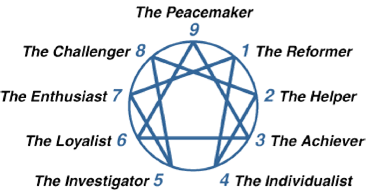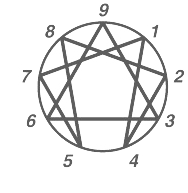|
 
Are you your Personality? Or much more?
We are motivated by one of two things: love or fear. LOVE looks like compassion, understanding, generosity, love, trust, peace; FEAR looks like anxiety, depression, judgment, confusion and overwhelm. Our journey is to recognize when we are coming from Fear and then consciously choose a loving response to life. It is a journey of awareness and choice. It is a journey from Ego into Essence.
Our essential nature is one of Love. Our Ego, or Personality, is motivated by fear. The Fear comes from feeling separate from our essential nature. When we do not feel love, for example, we do what we can to protect ourselves from the pain of separation, or we try to manufacture a way of being that feels like love. We become controlling, or addictive, or depressed, or needy, or angry or more. The Enneagram gives us a basic and simple window into how OUR particular personality looks at life and the habitual choices it makes to create a false sense of safety and love for itself.
The Enneagram is about understanding the negative habits we have developed to get through life. We all have them, we all depend on them and they undermine our potential.
The following it taken from the Enneagram Institute website. If you want to know your particular type and learn more about what YOUR personality is up to, click here: ENNEAGRAM
Your Basic Personality Type
From one point of view, the Enneagram can be seen as a set of nine distinct personality types, with each number on the Enneagram denoting one type. It is common to find a little of yourself in all nine of the types, although one of them should stand out as being closest to yourself. This is your basic personality type.
Everyone emerges from childhood with one of the nine types dominating their personality, with inborn temperament and other pre-natal factors being the main determinants of our type. This is one area where most all of the major Enneagram authors agree—we are born with a dominant type. Subsequently, this inborn orientation largely determines the ways in which we learn to adapt to our early childhood environment. It also seems to lead to certain unconscious orientations toward our parental figures, but why this is so, we still do not know. In any case, by the time children are four or five years old, their consciousness has developed sufficiently to have a separate sense of self. Although their identity is still very fluid, at this age children begin to establish themselves and find ways of fitting into the world on their own.
Thus, the overall orientation of our personality reflects the totality of all childhood factors (including genetics) that influenced its development. (For more about the developmental patterns of each personality type, see the related section in the type descriptions in Personality Types and in The Wisdom of the Enneagram. There is a discussion of the overall theory in Understanding The Enneagram (67-70).
Several more points can be made about the basic type itself.
- People do not change from one basic personality type to another.
- The descriptions of the personality types are universal and apply equally to males and females, since no type is inherently masculine or feminine.
- Not everything in the description of your basic type will apply to you all the time because you fluctuate constantly among the healthy, average, and unhealthy traits that make up your personality type.
- The Enneagram uses numbers to designate each of the types because numbers are value neutral— they imply the whole range of attitudes and behaviors of each type without specifying anything either positive or negative. Unlike the labels used in psychiatry, numbers provide an unbiased, shorthand way of indicating a lot about a person without being pejorative.
- The numerical ranking of the types is not significant. A larger number is no better than a smaller number; it is not better to be a Nine than a Two because nine is a bigger number.
- No type is inherently better or worse than any other. While all the personality types have unique assets and liabilities, some types are often more desirable than others in any given culture or group. Furthermore, for one reason or another, you may not be happy being a particular type. You may feel that your type is "handicapped" in some way. As you learn more about all the types, you will see that just as each has unique capacities, each has different limitations. If some types are more esteemed in Western society than others, it is because of the qualities that society rewards, not because of any superior value of those types. The ideal is to become your best self, not to imitate the assets of another type.
Identifying Your Basic Personality Type
If taken properly, our questionnaire, the Riso-Hudson Enneagram Type Indicator (RHETI), will identify your basic personality type for you. This short section is included so that we can have a basic understanding of the types in our discussion without having to go to the longer descriptions in the next section.
As you think about your personality, which of the following nine roles fits you best most of the time? Or, to put it differently, if you were to describe yourself in a few words, which of the following word clusters would come closest?

The Enneagram with Riso-Hudson Type Names
These one-word descriptors can be expanded into four-word sets of traits. Keep in mind that these are merely highlights and do not represent the full spectrum of each type.
Type One is principled, purposeful, self-controlled, and perfectionistic.
 Type Two is generous, demonstrative, people-pleasing, and possessive. Type Two is generous, demonstrative, people-pleasing, and possessive.
Type Three is adaptable, excelling, driven, and image-conscious.
Type Four is expressive, dramatic, self-absorbed, and temperamental.
Type Five is perceptive, innovative, secretive, and isolated.
Type Six is engaging, responsible, anxious, and suspicious.
Type Seven is spontaneous, versatile, acquisitive, and scattered.
Type Eight is self-confident, decisive, willful, and confrontational.
Type Nine is receptive, reassuring, complacent, and resigned.

|
 |